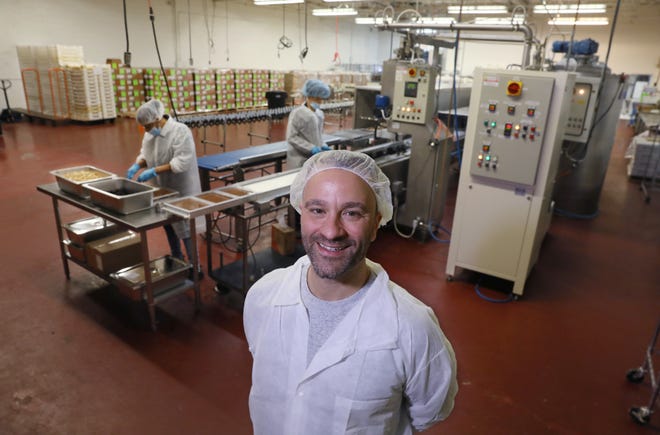Inside a low-slung, white building on East Main Street, near the intersection that leads to the Rochester Public Market, the Christmas rush has already come and gone.
The busy staff at the gleaming new Decocoa Chocolate Crafters factory has produced, packed and shipped 2.4 million cocoa bombs that will be sold in thousands of retail stores across the country. They’ve also made 70,000 white chocolate gift tags that say “Happy Holidays” and more than 150,000 holiday leaves; these are on their way to bakeries, where they will be used to decorate festive cakes.
Between now and the busy Easter season, they’ll be at work on the more everyday confections. Alex Vigneri, the factory’s ambitious CEO, expects to make more than 2 million chocolate bars this year.
While much of what the factory produces does not bear the company’s brand name, Vigneri has big plans to make the factory a point of pride for Rochester, complete with a Willy Wonka-esque experience for visitors.
How Decocoa got its start
The story of this chocolate factory originates in Sicily, where Gaetano Vigneri opened his own bakery. His son, Filippo Vigneri, grew up in the family business and apprenticed at bakeries in Italy. He immigrated to Rochester in 1967, and five years later he purchased Wojtczak’s Bakery, a longtime Polish bakery on Hudson Avenue.
That’s right ― the Italian immigrant bought a Polish bakery, and even kept its name and recipes. But he also added items from his own heritage, most notably European-style chocolate Easter eggs.
The Easter eggs were so popular that Filippo Vigneri started a separate chocolate business called Vigneri Confections, which until recently was located on Emerson Street. Operating January through March, the company made more than 40,000 pounds of chocolate eggs each year. Vigneri eventually closed the bakery to focus on the chocolate business.
Like his father, Alex Vigneri grew up in the family businesses; in his 20s, he left to work for a cocoa company in Africa. Seven years ago, he took over the business. Under his leadership, the company has added a focus on making chocolates for large retailers, each of which has a different chocolate formulation.
This resulted in rapid growth, and the company recently moved to a 49,000-square-foot building that recently housed the nonprofit secondhand shop Greenovation. Vigneri also purchased another 30,000-square-foot building behind it.
Vigneri said he got a good deal on the building, and tax breaks helped as well. But transforming what was once a bus garage into a state-of-the-art chocolate factory required a $5 million investment. “We went all in,” Vigneri said.
With the move, he’s also leaned into a new name for the company: Decocoa Chocolate Crafters. The Vigneri brand name will continue on with the line of chocolate Easter eggs.
The company currently makes 1 million pounds of chocolate annually; his goal is to hit 3 to 4 million within the next 2 years. That’s a lot of chocolate, but not huge in the world of chocolate. “My goal is to be a mid-sized manufacturer that makes small batches but high volumes,” he said.
How employing refugees has helped Decocoa Chocolate Crafters
The new Decocoa chocolate factory employs state-of-the art technology, with more equipment on its way from Italy. But a workforce dedicated to quality is critical.
When the factory experienced high turnover during the pandemic, Vigneri started hiring refugees, reasoning that he could pay forward the opportunities his father had been given as an immigrant in Rochester.
To accommodate the needs of this workforce, he partnered with the University of Rochester to offer English classes each week.
He found that refugees frequently needed time off for appointments, so he shifted to a 4-day work week, with 10-hour shifts each day. This paid dividends for the company because it meant less time spent setting up and cleaning production lines. “We ended up increasing our production, which is mind boggling,” Vigneri said.
The company now employs 22 refugees from Ukraine, Afghanistan, Ecuador and The Democratic Republic of the Congo. Vigneri said the company’s success has paid off for his staff; he has increased wages and instituted paid holidays. All of these efforts have resulted in decreased turnover for the company.
Coming in 2024: A chocolate experience
Next, Vigneri plans to add a Willy Wonka-esque experience center that will enable customers to see chocolate production in action through a large glass wall. Customers will also be able to dream up their own chocolate creations and watch as they are made to order.
The plain white façade of the building will eventually be enlivened with murals depicting chocolate production in Africa. A percentage of the companies sales goes back to farmers in Africa, earmarked for education, fresh water and empowering women.
Vigneri is ebullient about carrying forward Rochester’s longstanding tradition of food manufacturing. “Fanny Farmer started here in Rochester. Look what they became,” he said.
Tracy Schuhmacher covers food and drink for the D&C. Keep up to date with her food finds by subscribing to her weekly ROCFlavors newsletter.

